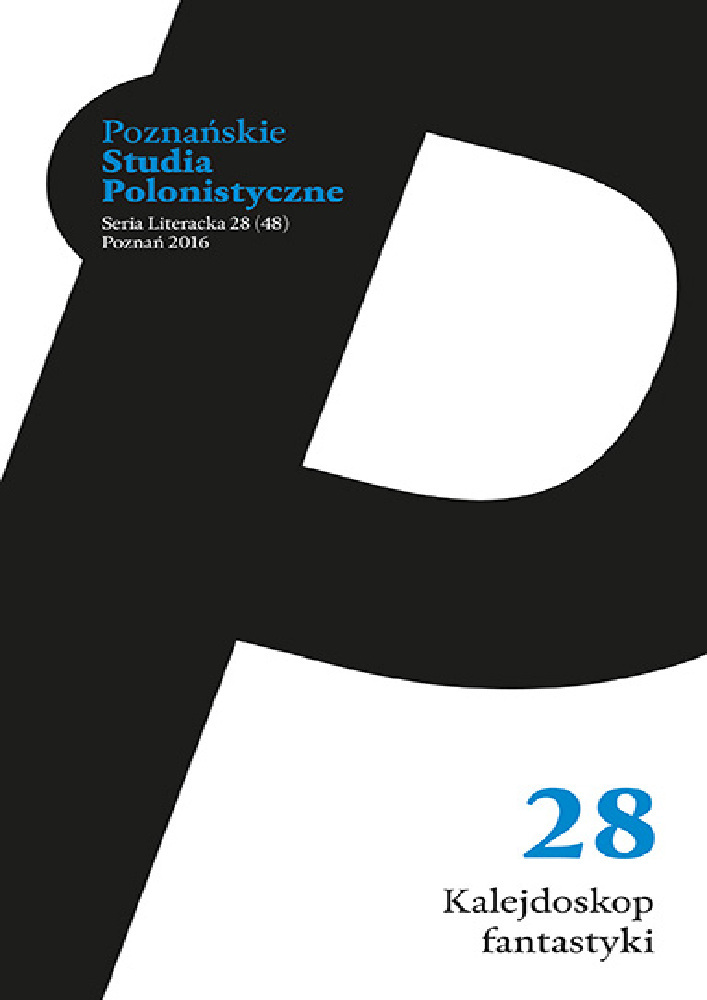Abstract
The article concerns with still not well-known part of the artistic work of Zdzisław Beksiński (a famous photographer, painter and graphic designer). In the 1960s the artist was occupied with literature as well. He wrote short prose which reflected many modern literary fashions and trends, and even anticipated some of them. In his literary works Beksiński was especially influenced by the suggestive aesthetics of the onirism, geometric architecture, and anti-Utopian novels. Sometimes, his narration refers to modern pop culture: the technique of film or the convention of comic strips; what is more, he applies the style of commercials and propaganda slogans. The artist from Sanok also adored writing different variations of the same story which let him play with various genres and plots. But, whatever he did, it was all about the construction, the form. His literary texts record their narrator’s consciousness in a minimalist way, without any traditional literary frills. Therefore Beksiński unconsciously realized the idea postulated at the same time by Cortazar: each prose work should not be a “sum”, but rather a kind of “difference”. This prose substantially complements our knowledge of the whole art of Beksiński, a natural genius, and remains another alternative part of his creative activities.References
Banach Wiesław (2011), Foto Beksiński, BOSZ, Olszanica.
Beksiński Zdzisław (2015), Opowiadania, wybór i opracowanie krytyczne Tomasz Chomiszczak, BOSZ, Olszanica.
Calvino Italo (1989), Jeśli zimową nocą podróżny, przeł. Anna Wasilewska, PIW, Warszawa.
Cortázar Julio (1998), Gra w klasy, przeł. Zofia Chądzyńska, MUZA SA, Warszawa.
Grzebałkowska Magdalena (2014), Beksińscy. Portret podwójny, Znak, Kraków.
Handke Peter (1969), Publiczność zwymyślana, przeł. Helmut Kajzar, „Dialog”, nr 6, s. 46-63.
Huxley Aldous (2012), Drzwi percepcji. Niebo i piekło, przeł. Marta Mikita, Cień Kształtu, Warszawa.
Krzeczkowski Henryk, Sito Jerzy S., Żuławski Juliusz, wybór i oprac. (1971), Poeci języka angielskiego, t. 2, PIW, Warszawa.
Listy Beksińskiego do przyjaciela (1996), [dostęp: 2 lutego 2016], http://beksinski.dmochowskigallery.net/library.php.
Nolan Christopher, reż. (2010), Incepcja (Inception), USA–Wielka Brytania, DVD, dystr. Galapagos.
Perec Georges (1982), Tentative d’épuisement d’un lieu parisien, Editions Christian Bourgois, Paris.
Robbe-Grillet Alain (1959), Gumy, przeł. Leszek Kossobudzki, Czytelnik, Warszawa.
Wachowski Andrew, Wachowski Laurence, reż. (1999), Matrix [ang. The Matrix] USA, DVD, dystr. Warner Home Video.
License
Authors
Authors of texts accepted for publication in „Poznańskie Studia Polonistyczne. Seria Literacka” are required to complete, sign and return to the editor's office the Agreement for granting a royalty-free license to works with a commitment to grant a CC sub-license.
Under the agreement, the authors of texts published in „Poznańskie Studia Polonistyczne. Seria Literacka” grant the Adam Mickiewicz University in Poznań a non-exclusive, royalty-free license and authorize the use of Attribution-NoDerivatives 4.0 International (CC BY-ND 4.0)Creative Commons sub-license.
The authors retain the right to continue the free disposal of the work.
Users
Interested Internet users are entitled to use works published in „Poznańskie Studia Polonistyczne. Seria Literacka” since 2016, for non-commercial purposes only, under the following conditions:
- attribution - obligation to provide, together with the distributed work, information about the authorship, title, source (link to the original work, DOI) and the license itself.
- no derivatives - the work must be preserved in its original form, without the author's consent it is not possible to distribute the modified work, such as translations, publications, etc.
Copyrights are reserved for all texts published before 2016.
Miscellaneous
Adam Mickiewicz University in Poznań retains the right to magazines as a whole (layout, graphic form, title, cover design, logo etc.).
